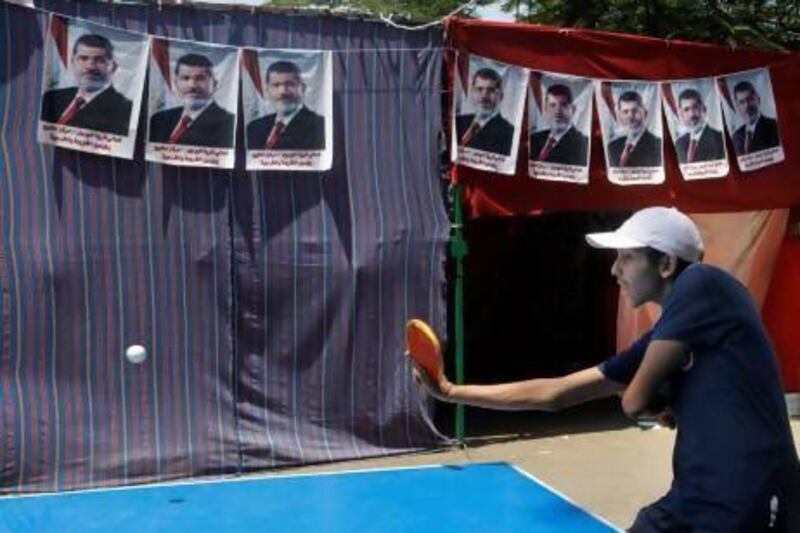CAIRO// The sit-in at Nahda Square outside Cairo University is into its second month and the participants show no signs that they anticipate being driven out anytime soon.
In the heat of the afternoon yesterday, one man wielded a hammer to make some home improvements to a tent housing half a dozen snoozing young men. Securing a wooden beam across the already sturdy structure, he sank a row of nails into it and began hanging up spare pairs of trousers, shirts and sunhats.
At the entrance to the camp, which houses several thousand supporters of deposed president Mohammed Morsi, a truck drove in with more beams to reinforce the hundreds of makeshift tents.
Elsewhere, a ping-pong tournament was in full swing, paddles swinging a little slowly in the heat. Damp washing hung on a line.
Another group of young men wearing T-shirts saying "pro-democracy" in English and Arabic, with the Twitter-savvy addition of a hashtag, was reading the Quran. Children huddled together in a tent next to a vendor arranging bright plastic toys to tempt their mainly niqab-clad mothers.
In the tense atmosphere that has prevailed in Cairo since the military, led by Gen Abdel Fattah El Sisi, removed Mr Morsi on July 3, the interim authorities have promised numerous times to clear this camp and another larger one in the Nasr City area.
But yesterday, once again, the authorities seemed to have balked. Security officialstold reporters that a decision to surround the camps had been postponed after it was leaked to the media on sunday. A few soldiers in trucks outside the camp were sprawled as drowsily as the demonstrators.
"This place is not safe," said Mohammed Mabrouk, a 23-year-old dentist. "We already know that, we know that very well. But we have a goal and we want to achieve that."
For weeks, he and his friends have lived with the ebb and flow of rumours that soldiers will strike the camp, that the police will besiege it, that local residents will attack. But they insist they are ready for any onslaught, and that if they are killed, more will come to take their place.
"If you take people, arrest them and kill them, you will find more people here - and if not here, in other squares," he said. "Egypt has thousands of squares! The issue is not the square."
Hopes of a peaceful solution to the political stand-off were dashed last week when the interim government declared that two weeks of international mediation efforts had failed.
Ahmed Al Tayyeb, the grand imam the august religious institution Al Azhar, had called for negotiations between egypt's fragmented political factions to begin this week. brotherhood leaders have staunchly refused to participate.
Elsewhere, demonstrators marched alongside the Nile, waving pictures of Mr Morsi and calling for his return. State media reported that a judge announced that the former president, imprisoned since July 3, would be held for a further 15 days while investigations into his links with the palestinian group Hamas were carried out.
Despite the somnolent atmosphere at the at Nahda Square camp, there was plenty of anger among its residents. "I want to kill him - Sisi," declared Mustapha, 25, an accountant. Among his friends there was a roar of approval at the idea.
The protesters, drawn mainly from supporters of the Brotherhood, have been accused in Egyptian media of being terrorists and hoarding weapons, something they deny. "We want to kill him, but we cannot," said Mohammed Ezzat, 39, a businessman,
"The army leaders are so bad," he added, though he said the rank-and-file soldiers were "our comrades".
Still, Mr Ezzat anticipates that either soldiers or police will come to clear the camp eventually. What will happen if they shoot? "We will die," he said simply, to cheers from the boys in the pro-democracy T-shirts. "All the people here wish to die."
"Our relatives and partners and fathers and mothers will come ... to make a new revolution," he added. "It will not be finished."
afordham@thenational.ae
twitter: For breaking news from the Gulf, the Middle East and around the globe follow The National World. Follow us





